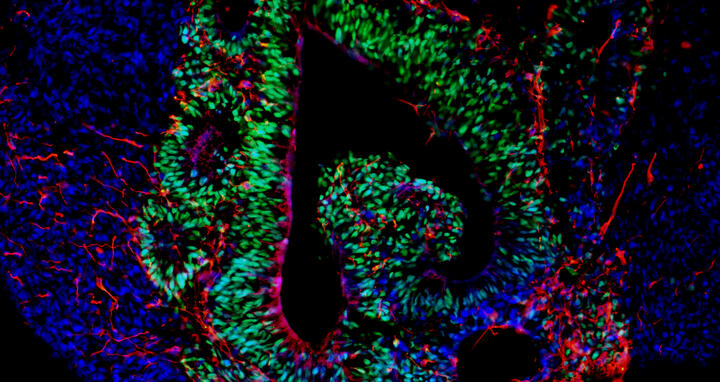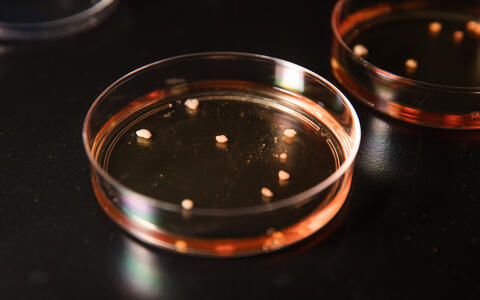Einstein Center 3R aims to advance animal-free research – in partnership with the MDC
The aim of the Einstein Center 3R (Replace, Reduce, Refine) is to develop new therapies for human diseases by improving the transferability of lab findings to patient care, while at the same time enhancing animal welfare. The Center’s research will focus on 3D models of human tissue, which will be designed to serve as a replacement for animal-based research methods. These special cell cultures, known as organoids, can be cultivated to resemble individual organs both in function and in structure. They open a new window into understanding and treating human diseases, and in some areas offer a wider scope of possibilities compared to the analysis of individual cells or animal testing. The challenge lies in developing organoids that resemble human organs as closely as possible in terms of maturity and complexity, i.e., “micro-organs“ with their own vascular and immune systems.
Organoids in a petri dish.
The Center’s funding is subject to a positive interim assessment by the Foundation’s independent research board in 2024. The necessary funding will be made available by the State of Berlin in addition to the Einstein Foundation’s basic budget. The funding approval decision came after a one-year preparatory phase.
“International experts and the Einstein Foundation’s independent research board strongly support the establishment of the Einstein Center 3R. Its research approach, its structure, and the degree of collaborative exchange across its partner institutions have the potential to make Berlin a leading hub for research into alternatives to animal testing,” said Prof. Günter Stock, Chair of the Einstein Foundation’s Executive Board, commenting on the Center’s funding approval.
Species-specific differences often limit the transferability of research insights gained during animal testing into practical treatment. Organoids, by contrast, offer biomedical researchers the major advantage of working directly with human cells. The Einstein Center will accommodate six research projects focusing on the intestines, lung, heart, brain, liver, and neuromuscular junctions, respectively. These will be complemented by two cross-sectional quality assurance projects designed to improve the models and define measures and principles to guide the projects’ research. In addition, the Center will set up an imaging and analysis platform in order to improve the comparability of human and animal-based models regarding the specific characteristics of diseases such as COVID-19.
Berlin’s mayor sees a leading role for the city
Berlin’s Governing Mayor and Senator for Higher Education and Research Michael Müller said: “Together with Charité, our universities, and our research institutes, we have done much in recent years to establish Berlin as an international research hub for exploring and developing alternatives to animal testing. The newly launched Einstein Center 3R is part of this effort, bringing together the outstanding expertise of Berlin’s pioneering and innovative biomedical researchers. With its broad network of institutions, the city is taking a leading role across Germany and internationally.”
The founding institutions of the Einstein Center 3R are Charité – Universitätsmedizin, Freie Universität Berlin, Humboldt-Universität zu Berlin, and Technische Universität Berlin, which established the Center in close cooperation with the Berlin Institute of Health, the Max Delbrück Center for Molecular Medicine in the Helmholtz Association, the German Federal Institute for Risk Assessment (BfR), and the Robert Koch Institute. The Center’s long-term aim is to build a Berlin-wide research network that explores tissue models and develops cutting-edge projects. The 3R principles, introduced by William Russell and Rex Burch, seek to substitute animal experiments with alternatives (replace), minimize the number of animals used in experiments (reduce), and ease the amount of stress put on animals (refine). Education and training will help early career researchers to rigorously employ this principle throughout their work. Communication and outreach programs will also play a significant role in the Center’s activities.
“We are delighted that the Einstein Center 3R will now provide us with a cross-institutional framework that strengthens the role of the 3Rs, supports the development of alternative methods, and promotes exchange among researchers and projects across Berlin,” added Prof. Axel Radlach Pries, Dean of Charité.
The MDC’s role focuses on stem cell and organoid technologies
The MDC is involved in the Einstein Center 3R with several research initiatives. For example, Professors Mina Gouti, Carmen Birchmeier, and Nikolaus Rajewsky and their respective teams are working to develop and characterize mature human organoids from pluripotent stem cells that closely resemble adult tissues. This will make it possible to model diseases that develop late in life, such as amyotrophic lateral sclerosis (ALS). Such progress will require collaboration among interdisciplinary teams working at the intersection of stem cell and organoid technologies, mouse genetics, and systems biology. This could ultimately help reduce the number of animal models needed for research. In the long term, the development of sophisticated organoid models could also lay groundwork for new approaches in personalized medicine.
MDC scientists Professor Michael Gotthardt and Sebastian Diecke are teaming up with Charité cardiologist Burkert Pieske to investigate genetically engineered heart tissue (EHT), which they will derive from human pluripotent stem cells. This will enable them to conduct more in-depth research into the causes of and treatments for cardiovascular diseases – still one of the most common causes of death worldwide – and to find new therapeutic approaches. They also intend to compare findings from animal experiments with those from EHT technology. In addition, they want to establish the necessary infrastructure in Berlin to give as many scientists as possible access to EHT technology.
Prof. Thomas Sommer, interim Scientific Director of the MDC, commented on the decision: “Replacing, reducing, and refining animal experiments is a top priority for us at the MDC. In our medical research, we use cell and tissue cultures, computer models, and artificial intelligence in the vast majority of all experiments. In addition, we have established a platform dedicated to organoids at the MDC and now have considerable experience in this field. So I am thrilled that we can contribute our expertise to Berlin’s Einstein Center 3R and work with our partners to advance its efforts. The Einstein Center represents a milestone on the way to further developing alternatives to animal research. This is important for Berlin as a research hub and as a pioneer in this area. However, from today’s perspective, I have to stress that animal experiments are still indispensable for basic research and drug development.”
Further information
Contact
Jutta Kramm
Head of Communications
Max Delbrück Center for Molecular Medicine in the Helmholtz Association (MDC)
+49 (0) 30 9406 2140
jutta.kramm@mdc-berlin.de or presse@mdc-berlin.de
Dr. Corinna Pelz
Einstein Center 3R (EC3R)
Preparation Module Coordination
Chausseestr. 20 | 3rd floor
10115 Berlin
Tel. +49 30 450 580188
corinna.pelz@charite.de
- Max Delbrück Center for Molecular Medicine (MDC)
-
-
The Max Delbrück Center for Molecular Medicine in the Helmholtz Association (MDC) is one of the world’s leading biomedical research institutions. Max Delbrück, a Berlin native, was a Nobel laureate and one of the founders of molecular biology. At the MDC’s locations in Berlin-Buch and Mitte, researchers from some 60 countries analyze the human system – investigating the biological foundations of life from its most elementary building blocks to systems-wide mechanisms. By understanding what regulates or disrupts the dynamic equilibrium in a cell, an organ, or the entire body, we can prevent diseases, diagnose them earlier, and stop their progression with tailored therapies. Patients should benefit as soon as possible from basic research discoveries. The MDC therefore supports spin-off creation and participates in collaborative networks. It works in close partnership with Charité – Universitätsmedizin Berlin in the jointly run Experimental and Clinical Research Center (ECRC), the Berlin Institute of Health (BIH) at Charité, and the German Center for Cardiovascular Research (DZHK). Founded in 1992, the MDC today employs 1,600 people and is funded 90 percent by the German federal government and 10 percent by the State of Berlin. www.mdc-berlin.de
- Einstein Foundation Berlin
-
-
The Einstein Foundation Berlin is an independent, not-for-profit, science-led organization established as a foundation under civil law. It promotes international cutting-edge science and research across disciplines and institutions in and for Berlin. To date, it has funded 172 researchers, including three Nobel laureates, 71 projects and six Einstein Centers.










